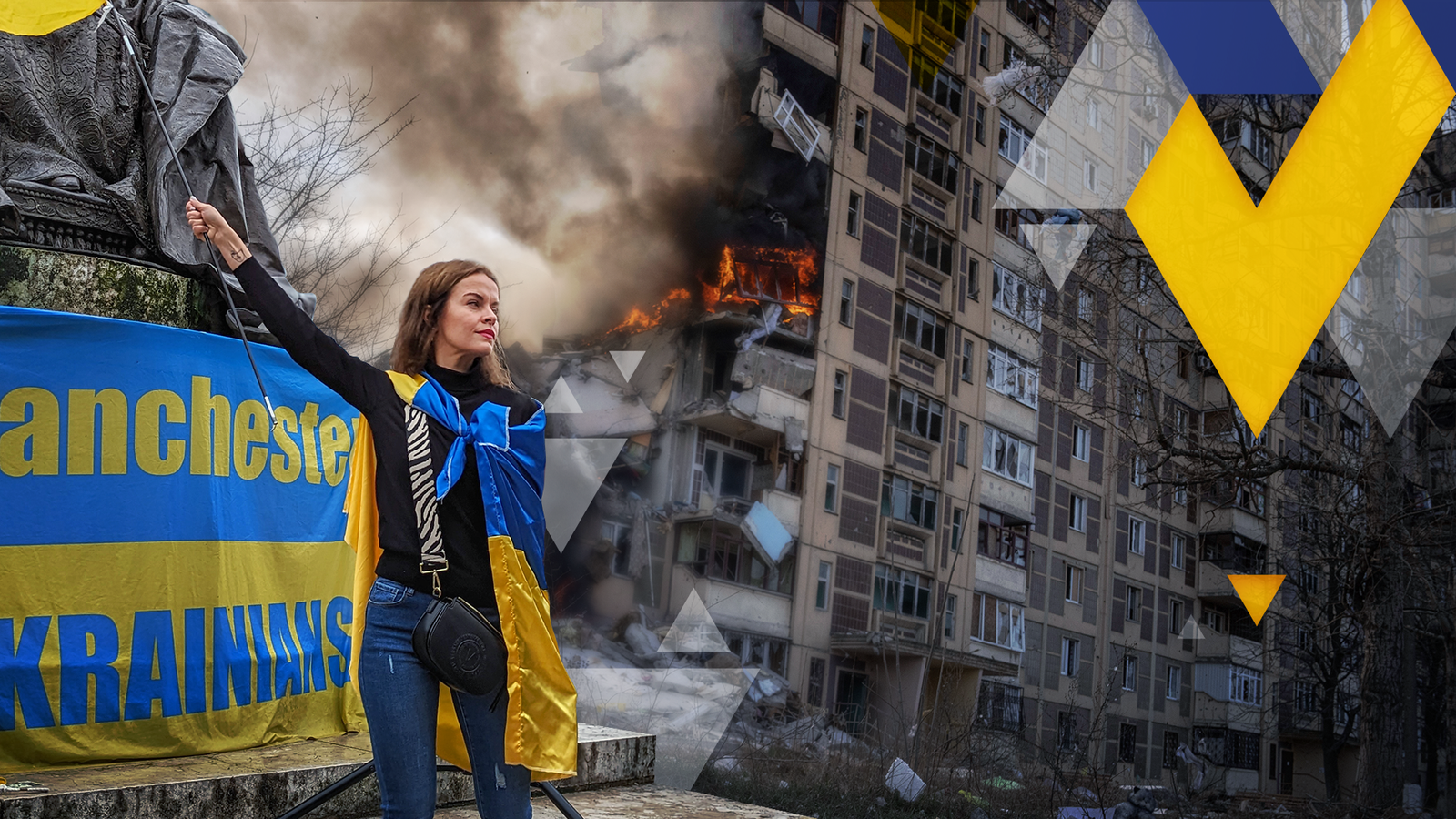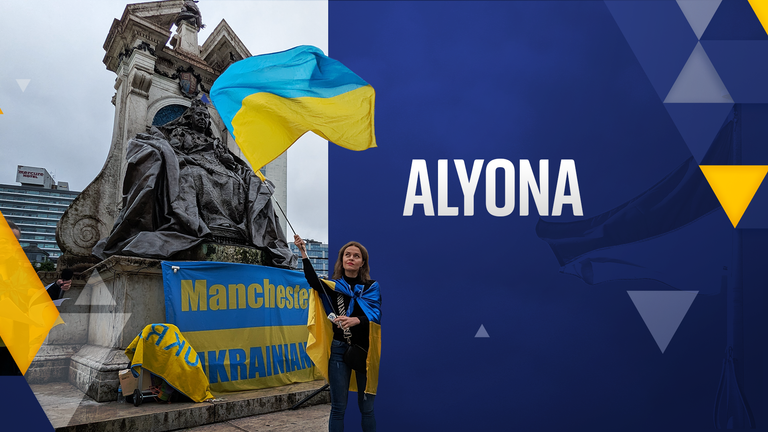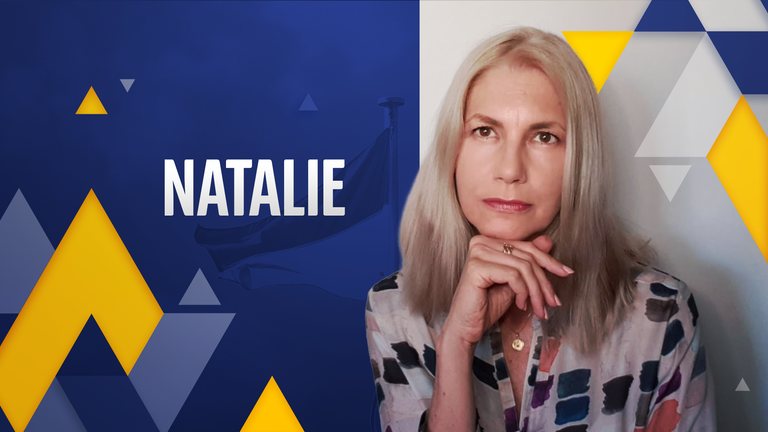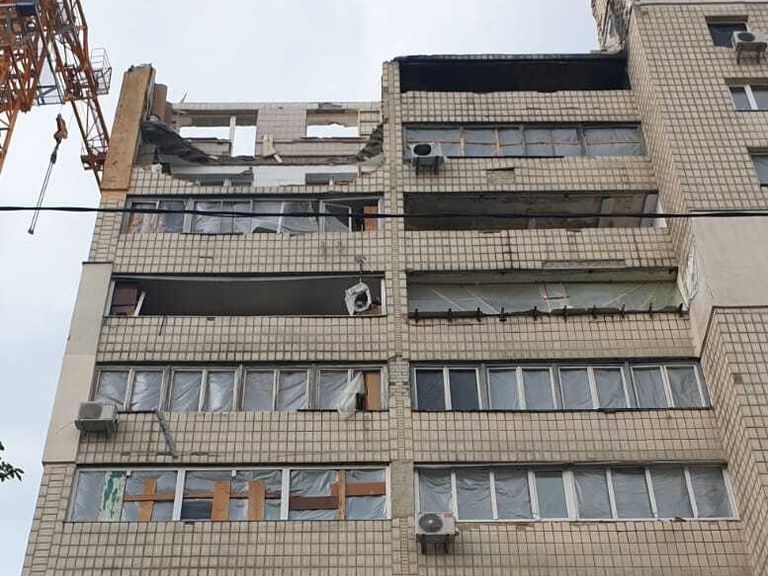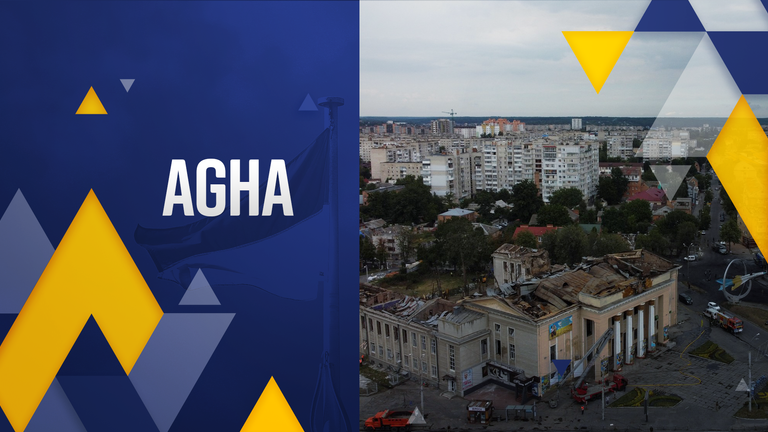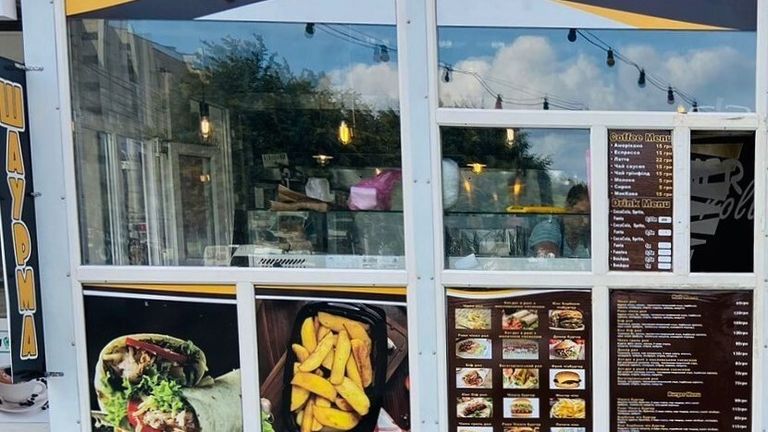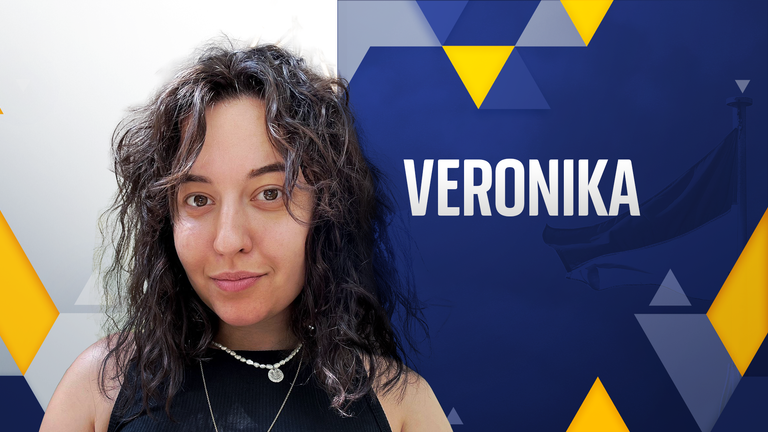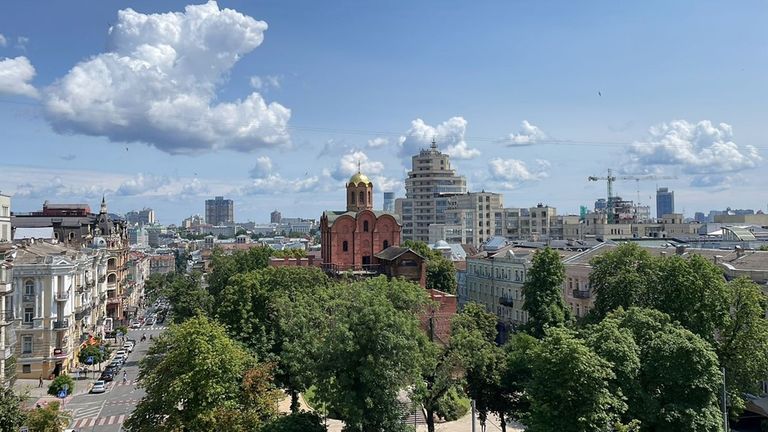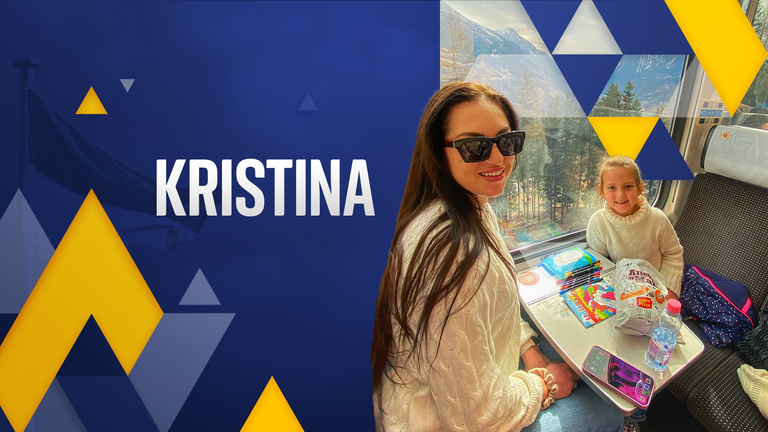Russia’s invasion of Ukraine forced millions of people to flee their homes. Almost 170,000 of them have spent much of the last 18 months navigating new lives in the UK.
Sky News spoke with five refugees who shared their stories of starting over in Britain, risking life and limb to visit their homeland, and their hopes and fears for the future of the war.
‘Helpless as my family preps for nuclear disaster’
Knowing her family is preparing for the “end of the world” near an imperilled nuclear plant makes the safety of the UK bittersweet for Alyona Kaporina.
The director, 39, has found support in her new home of Manchester, but she feels “completely helpless” knowing her sister, Valentina, and niece, Agnessa, are “living in fear” in a village close to the Zaporizhzhia power station.
In June and July, the plant was threatened by a collapsed dam, explosives allegedly installed by Russians, and power outages caused by military activity.
“These were very exhausting weeks. We are preparing and living in constant expectation of the end of the world,” says Agnessa, with Ms Kaporina acting as a translator.
“We have been living with a sense of fear… no sedatives work any more.”
While her family stocks up on iodine tablets, tapes their windows airtight and hermetically seals their food in case of nuclear disaster, Ms Kaporina waits nervously for news 1,600 miles away.
“It is not just words, it is a real threat,” she says.
“In June, it really scared me and my relatives, and they really prepared. I was really very nervous.”
Fighting on the information front
Unable to help her family on the frontline, Ms Kaporina, originally from Kyiv, has devoted herself to what the Ukrainians call the “information front” by organising a rally in Piccadilly Gardens every Saturday.
Refugees meet to speak in their native language, sing Ukrainian songs and to remind the UK the war is still raging.
“I think the world is a little bit tired maybe about news from the war. And people in Ukraine are tired but our soldiers continue to die defending our country,” she says.
Last week, a close friend’s husband was among them, leaving behind his pregnant wife.
“It happens every day. Sometimes you don’t know those people, sometimes you know those people who died for your freedom, your independence.”
Explaining why her group gathers every Saturday, Ms Kaporina says: “Russia continues to attack our civilian people, our civilian cities, and we never know when it will be over. We [don’t] have any right to forget.”
People from England, Belarus, Azerbaijan and Lithuania join her each week to raise awareness.
“It is really important and it’s really [a] pleasure and we are grateful to a lot with people for their support.”
Ms Kaporina says the UK has been very welcoming since she arrived in May last year, but she and other Ukrainian refugees have struggled with incompatible job qualifications and felt isolated by language barriers.
“I know that for many people it is a big problem because when you live in Ukraine you can have very nice degree, and you can have a very high job and a very big experience, but when you arrive in UK and you don’t speak English you are really nobody,” she says.
‘Missiles almost killed me twice – and I’m going back again’
Mother of two Natalie Baksheieva is full of gratitude for the welcome she has received in Winchester – but it won’t stop her returning to her homeland, even if her life is in danger.
“What struck me here is that people are genuinely, sincerely compassionate,” she says.
“I am touched. I feel it is so important for us to survive. This idea that we are not alone gives us strength.”
Missiles have almost killed Ms Baksheieva twice during her three trips back to Kyiv.
Russian bombs exploded a little over a mile away from her flat in October, striking the route she planned to take to the dentist.
Before that, her neighbouring block of apartments was partially destroyed by rockets hours after she left the city at the end of a separate visit last July.
She remains undeterred, with another trip to settle legal proceedings over the guardianship of a relative planned next month, but says she is “afraid” of the “roulette” she is playing.
“Honestly, I dread it,” she says, adding there have been four sirens a day in recent weeks.
Separated from her son
Multiple people died, cars were incinerated and a “huge crater” was left next to her dental practice in October’s attack. Ms Baksheieva, a sales coach, fears her son, 22, trapped in Ukraine by martial law, might be among Russia’s next victims.
“Living with this, it is painful. It is like an ongoing pain that you cannot just brush off because it is about your kids,” she says.
During her first visit back, nobody smiled and “you could feel the anxiety in the air”, but by 2023, acute stress had become “chronic” background anxiety.
Sirens were constant, but people were used to it. Missiles exploded, but often shot down by Kyiv’s air defence shield.
“At the beginning there would be empty streets. With time, people would ignore sirens and continue to play in the playgrounds with kids.”
Ms Baksheieva, who grew up in the Soviet Union, has harsh words for anyone calling for a compromise with Russia to end the war.
“Have you ever lived in an unfree country? Have you ever experienced that? Because [freedom] is like air, you don’t realise it until you don’t have it.”
She describes a lack of freedom as “something physical”, adding: “You don’t understand. It is like living suffocating.”
I didn’t vote for Zelenskyy
Ms Baksheieva credits Volodymyr Zelenskyy for the West’s backing – despite having not voted for him.
“I didn’t think he was a great president before but what he has done since the beginning of the war is extraordinary.
“I think it is diplomacy 2.0 that he created. Because he is not a diplomat. Because he jumped from stage to presidency, he lacks all those layers of we-are-very-concerned bulls***.”
Returning to Ukraine because he ‘can’t survive’ cost of living crisis
The cost of living crisis and separation from his wife and young son have convinced Agha Hassan Abbas to return to Ukraine.
He found he “can’t survive” here on the shifts he picks up as a barista and his wife, who is Pakistani, has had her visa denied.
Having spent the past year moving between the Netherlands, Germany, Ireland and Canada before his arrival in the UK, Mr Abbas fought back tears as he described being left with nothing.
“I am not happy. Sometimes I am sitting and I am crying,” he says. “We are not living.”
He recalls his prosperity in Ukraine: “I had so many things there. I was the owner of my shops. I had my own home, I had my car, but now everything is zero in my life and I am going to start again. It is very disturbing for me. I am 42 years old.”
This is not the first time Russia has forced Mr Abbas to start over. He abandoned his first kebab shop in Luhansk for the western city of Vinnitsa in 2014 when Russian armed groups seized parts of the Donbas.
“I never thought it would happen again in my life. In my life I have seen two times war. Two times I have started my life and I lost everything,” he says.
Mr Abbas was in Pakistan visiting his wife’s family when Russia invaded Ukraine last year, and did not settle in one country until arriving here in January.
He had hoped he could sell his car, welcome his wife to the country and that they could make a living doing “any small job” anywhere affordable – but his hope is lost.
“I don’t know when, but I will go back [to Ukraine] because I don’t think I can survive alone here… I don’t know how I will manage it – it’s very expensive,” he says, adding that he is very thankful nonetheless to have been offered a visa in the UK.
Having renounced his Pakistani citizenship when he became a Ukrainian national in 2005 (Ukraine does not allow dual citizenship), Mr Abbas says he cannot join his wife in Pakistan either because he is not allowed to work in the country.
He recognises he is taking “a very big risk” returning to Ukraine, but says it is his home.
“I have everything in Ukraine. My whole life I spent everything, I risk everything, in Ukraine.”
Asked if he intends to help rebuild when the war is over, he says there is no doubt in his mind.
“The land who give me everything: My everything for this land,” he says.
“I will participate – not physically because of an issue – but I will participate financially, if I am there and I am earning.”
He vows: “I will start again.”
Marriage in the aftermath of a ‘massive’ Russian attack
Watching her cousin exchange vows in the aftermath of a “massive” attack on Mykolaiv was “surreal” for Veronika Prykhodko, 27, who has been living in London since last May.
As the authorities searched for bodies in buildings destroyed by Russian drones, she and her relatives at the wedding last month toasted the Ukrainian army for enabling them to hold it.
The night before, Ms Prykhodko and her mother, who were visiting Ukraine for three weeks, saw air defence systems spring into action for the first time, firing a “chain” of rockets at incoming drones, which exploded and rained down hunks of metal.
“It is basically a movie that you watch with your eyes from the window – which is wild,” Ms Prykhodko says.
It was a stark example of how her friends in Ukraine now live two very different lives, one during the day and one at night, when most Russian attacks occur.
While visiting Kyiv, Ms Prykhodko slept in a bathroom or an underground car park to escape missile strikes, before waking up to drink coffee with friends on another “beautiful day”.
“That’s the routine. That’s the new normal. Everyone is very philosophical about it. They’re like ‘if it hits me it hits me, I did everything I could’. They hide obviously and do everything to protect themselves, but there is no way they can 24/7 sit at home crying,” she says.
Ms Prykhodko is sanguine, likening positive experiences to putting on an oxygen mask during a plane emergency before helping anyone else.
“You cannot just live on patriotism. You really need to live your life – and then be able to help the army and help rebuild the country’s economy.”
Anger and guilt
That’s not to say the daytime in Kyiv was normal. Air-raid sirens were near-constant. At all times, Ms Prykhodko considered where she could hide if bombs began to fall.
She described an unabating tension driving her “crazy”, paranoia prompting her to hear sirens when there weren’t any. But one emotion overrode all others.
“I was angry the whole time,” she says. “The nation has never been so angry and so p***ed at somebody. I’m not just saying everyone hates Putin but you hate the whole country too.
“What I hate the most is I cannot feel safe in my own country.”
Read more from Sky News:
What a new UK defence secretary means for Ukraine
New video of Prigozhin from days before death
Russia uses ‘200-year-old strategy’ to protect Crimean bridge
Returning to London at the end of last month came with its own emotional burden – the gnawing feeling of “survivors’ guilt”.
Ms Prykhodko says she feels “privileged” to be safe, to work and afford to rent, to be a woman who can leave the country while men like her father, aged between 18 and 60, remain under martial law.
“You unconsciously start blaming yourself for having such a good situation,” she says.
People in the UK have been “mega supportive”, she says, particularly of her mother, who speaks little English and has struggled to communicate while buying food or using the job centre.
But the Homes for Ukraine scheme visa ends in 2025, and the pair are in limbo over what happens next.
“The future is quite blurry but also que sera, sera, we’ll see what happens. I’m hoping the war will be over.”
‘My daughter speaks English now – but what happens when our visa runs out?’
A dentist who fled to the UK with her six-year-old daughter has described the heartbreak of seeing her child “lose everything”.
Both have been forced to start their lives again, with Kristina Nepushenkov, 47, finding her qualifications aren’t recognised in the UK and Agatha restarting her education at reception level without any friends.
After a year and a half in England, Agatha is unable to read or write in Ukrainian, so Ms Nepushenkov wants to continue her education in the UK – but the visa system has left them in limbo.
“I want to make my daughter happy. She lost everything,” says Ms Nepushenkov, who lives in Maidenhead.
“She always asks ‘where are my grandparents, where is my dog, where is my father, where are my friends?’ And what I can do?”
Some of Ms Nepushenkov’s friends stayed in Ukraine: “It’s not that they don’t care for their lives – they choose to stay because it’s very scary to lose everything.”
Ms Nepushenkov, now training in dentistry for the second time, says she knows numerous Ukrainian medical professionals, including doctors, whose qualifications could not secure them jobs in the UK.
They have found themselves earning less money and facing a higher cost of living, while struggling to find places to rent. Ms Nepushenkov and her daughter live in a one-bedroom flat.
Click to subscribe to Ukraine War Diaries wherever you get your podcasts
“It is a strange feeling,” she says.
“It is like your life has completely changed. But I try to find better in this situation – because maybe for my daughter it is better to live here.”
Developing her language skills has made Agatha happier in the UK than when she first arrived, Ms Nepushenkov says.
“She started to speak with officials, with waiters in the restaurant, and she is so happy that they understood her.”
She laughs. “Sometimes I cannot understand her. English people understand her very well, but I can’t.”
Yet it could “all be for nothing”, she says, if their visas aren’t extended at the end of next year.
The pair remain in limbo over what status they will have in the UK in 2025 – while also uncertain if they will have a home to go back to in Ukraine by then.
